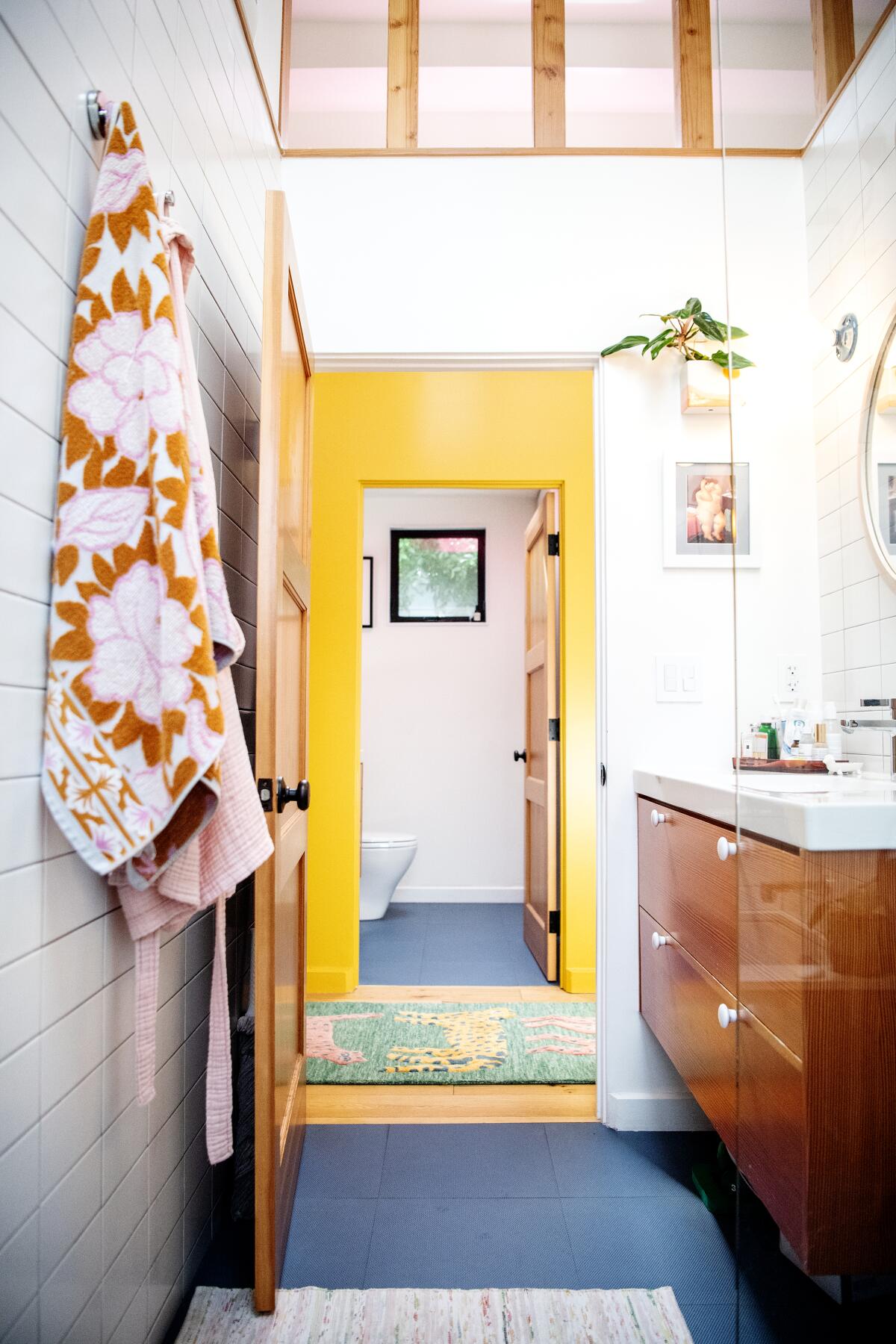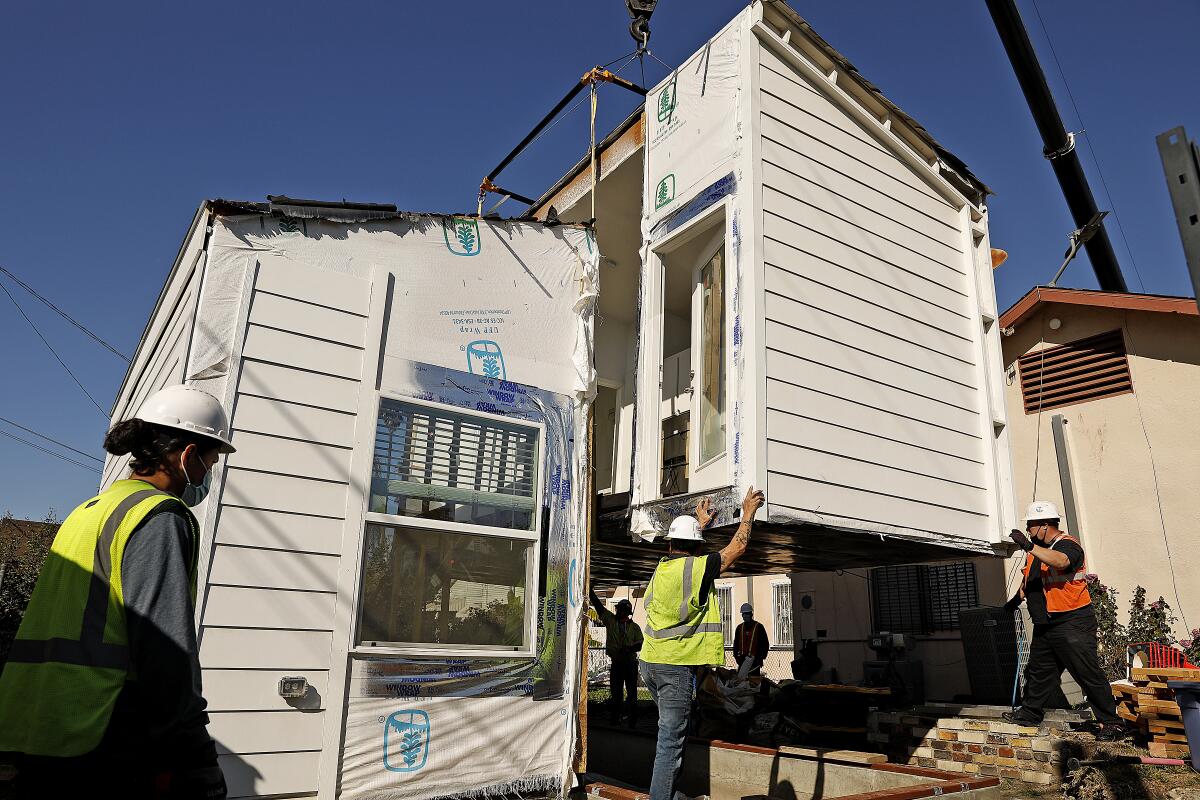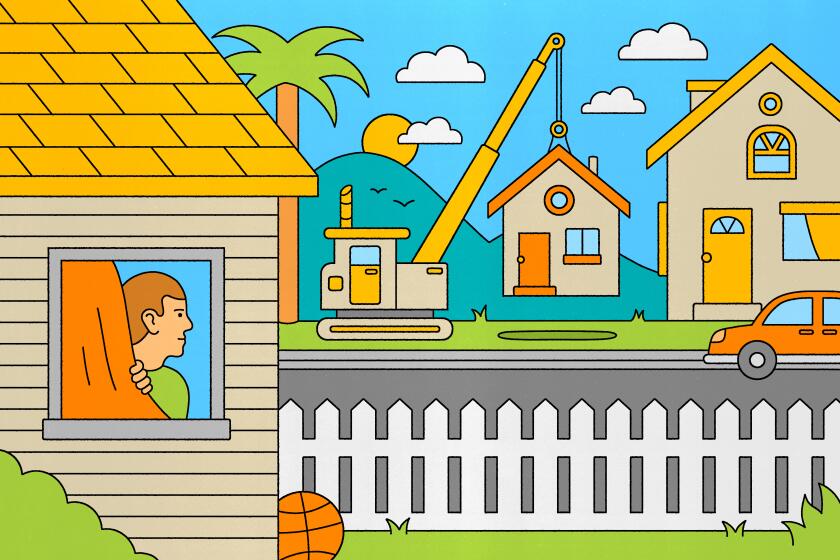You Do ADU, Part 4: Finding the right contractor

- Share via
In many ways, an accessory dwelling unit is as complex and demanding a construction project as a full-sized house. So even if you have a clear vision for what your ADU will look like, all the way down to the sink fixtures and the recessed lighting, you’re still going to need to hire some help to bring it to fruition.
For starters, you’ll need a site plan that complies with local land use and design rules. You’ll also need to build the unit in compliance with state safety, fire and green building standards, then meet the local utilities’ requirements for handling water, power and sewage.
Under state law, any job that costs at least $500 (for labor and materials) has to be performed by someone licensed by the Contractors State Licensing Board. So unless you’ve got your own construction company with in-house architects and engineers, you’re going to need to find some experts to help you.
Here are some tips from the experts themselves on how to do that.
Sign up for You Do ADU
Our six-week newsletter will help you make the right decision for you and your property.
You may occasionally receive promotional content from the Los Angeles Times.
Where to start
Which experts you’ll need to hire will be determined by which route you take to build your ADU, as discussed in the previous installment. Will you hire an architect and a builder separately? Will you go with a design-build firm? Will you choose a company that makes prefabricated ADUs?
No matter which direction you follow, you’re going to have to hire someone. And that’s where many aspiring ADU owners draw a blank.
Thanks to the internet, you shouldn’t have any problem coming up with a bunch of names of architects, design-build firms and prefab companies that can help you. The challenge is determining which pros are worth your trust and your money.
One place to start is with the handful of online search sites such as GreatBuildz, Houzz and BuildZoom that specialize in housing professionals. These recommend contractors in your area based on a rating system that varies from site to site.
Paul Dashevsky of Los Angeles launched GreatBuildz after a decade spent flipping houses with a succession of hired pros. “I had a lot of good experiences, and I had a lot of bad experiences,” Dashevsky said.
To help consumers separate the wheat from the chaff in the mass of professionals, GreatBuildz interviews general contractors and their references, looks at their experience and online ratings, checks their licenses, finances and background, and has them sign a code of conduct, Dashevsky said. It then matches the homeowners who come to its site with recommended pros; the service is free to consumers, but contractors pay GreatBuildz a finder’s fee whenever they are hired through the site.
Unlike sites like Yelp, though, “our service people stay involved throughout the project,” answering questions and mediating disputes, Dashevsky said. “You have an advocate as a client,” he said.
Houzz offers both a search function that lets you find pros in your area and a recommendation engine that suggests a few firms to interview. Liza Hausman, vice president of industry marketing at Houzz, said the site tries to distinguish itself by presenting extensive images of a contractor’s work.
Any professional can create a profile on Houzz, Hausman said, but the site determines each one’s ranking in the listings. It does so based on how many reviews the company has gotten and the quality of reviews, how often it adds to its portfolio, and how detailed its profile is.
“We look at our site as, like, this is a way to put together a short list” of potential hires, she said, adding that users still need to vet the pros themselves.

There are also less specialized sites such as Yelp, Angi and Thumbtack that compile browsable lists of building professionals, among many other service providers. You’ll search for either the type of help you’re looking for (say, an architect or general contractor) or the project you have in mind, then the site will display a number of professionals who work in your area — and, in some cases, those who’ve paid the site for prominent placement in search results.
The sites let you flip through the profiles that professionals have created, which typically include photos of their work. Significantly, they’ll also give you an idea how much experience the firms have, at least in terms of the number of times they’ve been hired through the site. And if a firm piques your interest, you can set up an appointment through the site.
One other useful feature of these sites is that they offer reviews of each firm from the people who’ve hired or just interacted with them. The number of reviews filed can be another indication of how experienced or in-demand a firm is.
But because published reviews have such a powerful effect on a firm’s clientele, researchers say, businesses have a strong incentive to post fake ones — either to boost their own ratings or hurt their rivals’. Yelp, at least, tries to improve the reliability of its ratings by filtering out the most extreme ones; fake reviews tend to fall into that category.
John Geary, CEO of prefab manufacturer Abodu, said even the reviews on Yelp and Google from real customers should be taken with a grain of salt. “There will always be folks who’ve had a tough experience and will want to express that,” he said. Comments usually are left by people who are eager to praise or criticize, which means they won’t reflect the customers who don’t have strong feelings one way or the other.
ADUs are becoming such a hot commodity, companies are popping up right and left online to offer advice — sometimes for a fee. Be sure to understand the company’s business model before trusting its recommendations or giving it your money.
Small-space living is a big trend in Southern California. Get inspired by these local ADUs and learn how to plan your own build.
Do a vibe check
Interviewing prospective hires is a must. When you’re searching for a professional, you’re looking for more than just reliable work at a reasonable price — you’re looking for someone you can trust.
Unless you make your living in the construction business, you’ll be at a huge disadvantage when it comes to information and expertise. That means you’ll have to rely on a stranger to tell you what you can and should do, what it will cost, and how to manage the problems that invariably crop up.
At the same time, you’ll be looking for someone you can work well with on a project that’s going to take months. “Part of it comes down to comfort level and how you relate to the respective professional,” said Robert Berry, founder of the Long Beach-based design-build firm ADU Homes.
“You don’t shop around for a price,” advised Danny Shuster of Construction & Consulting Services, a design-build firm in Los Angeles. “You don’t shop around for a bargain. You don’t shop around for whoever can finish it the fastest. You literally shop around for the right rep from the right company.”
Vibing with the representative who meets with you is crucial, Shuster explained, because that person will be the one who manages your project and responds to your questions and concerns throughout the work. He said he gets a call probably every month from someone who’s been misled by a representative from another company and needs a new contractor to get a project back on track.
Make sure to ask the professionals you interview how and how often they communicate with their clients. Ask how much time they typically spend with clients up front to explain the process, examine the site and look for potential issues. Find out how often they’ve gone through the permitting process in your city, built the type of ADU you want to build, and worked with homeowners with goals similar to yours.
Be wary of reps who promise top-notch work and materials at rock-bottom prices, Shuster said, adding, “There are reps that you can get that you would know right away, they’re there for the bottom line.”
For example, one homeowner who’d spent $200,000 building an ADU with another company came to CCS because he couldn’t get a certificate of occupancy from the city. Shuster found that the work was decent, but no permits had ever been applied for. He said it cost $25,000 to demolish parts of the structure so inspectors could check the work, then rebuild them.
“That’s more common than I’d like to admit,” Shuster said. Some version of a bait-and-switch, he said, “probably happens on about 20% of the jobs.”
Do your homework
For the vast majority of homeowners, hiring a contractor is not, shall we say, a core skill. But there’s plenty of advice online; here’s a sampling.
Get multiple bids
Don’t hire the first architect or contractor you click with. You need to give a good, hard look at several potential hires.
Every builder interviewed in connection with this story said that homeowners should get multiple bids before hiring anyone. David Lang, a builder based in Los Angeles, offered this blunt assessment: “Always get at least three bids, because in this industry — I hate to say this about any industry I work in — there’s a lot of, I don’t want to say corruption, [but] there’s a lot of thievery.”
The difference in the amounts bid can be surprising and daunting (or, as Lang put it, “insane”). A huge gap between the high and low bids can make both seem unreasonable, which isn’t necessarily fair to the low bidder, whose rate may be helped by less overhead, lower labor costs, familiarity with the local requirements and other concrete advantages.
At the same time, experts advise against taking the lowest bid simply because it’s the lowest.
“People have to understand that you get what you pay for,” Berry said. “If it seems extremely low-priced, there’s probably a reason.” For example, he said, the company may cut its overhead by paying less attention to its subcontractors’ work.
Geary of Abodu agreed, citing such variables as the quality of the building materials, labor, craftsmanship and communications with local officials, vendors and subcontractors. The difference can show up right away when the project runs into delays and cost overruns, or in the longer term when subpar materials wear out after just a few years, he said.
Another thing to be wary about, architect Sevak Karabachian said, is a contractor with a clear calendar. “If a contractor says they can start next month, that is your first red flag,” Karabachian said. “Either you’re lucky and catching them when they just lost a job, or it’s more likely that they don’t get referred due to a poor job on their past projects.”
And be sure to ask your bidders about the types of insurance they carry, said Brian McCarthy, who runs a design-build firm in Van Nuys. “In order of importance, they are workers compensation, general liability, and vehicle,” McCarthy said in an email. The policies, which can be expensive for contractors, protect property owners from liability and loss. “These are all things cut-rate contractors cut to lower their overhead and undercut guys like me,” he said, yet few homeowners ask about them.
We want to hear from you
Are you building an ADU or considering one? Do you have insights to share or unanswered questions? Or horror stories? Tell us.
Check references
Another widely and strongly recommended step is to examine the track records of competing bidders. Sean Phillips, founder of design and construction management firm Otto ADU, said one way to do so is to talk to other people who have hired your bidders for their own ADU projects.
Design and construction pros should be quick to offer the contact information for past customers, and it’s a strike against them if they don’t. On the other hand, they’re not likely to hook you up with people who’ve been unhappy with their services. So you’ll need to ask questions that are designed to surface potential problems even from people who gave five-star reviews.
This would include asking what they would have done differently on the project and where they thought their pros could improve in the future. Also be sure to ask what surprises cropped up and whether the price tag increased over the course of the construction, both of which could be signs of a company that lowballs its bids.
Another place to look is the California Contractors State License Board’s website, which will reveal whether the pro you’re looking to hire has an active license in the state. Remember, state law requires you to use only licensed professionals to build your ADU.
The site also includes any complaints that the licensing board has brought against the contractor or construction-related civil judgments that were reported to the board. Unfortunately, it won’t reveal any disputes that were settled through arbitration.
The Federal Housing Administration is proposing to let lenders include future rent from an ADU when calculating how much a borrower can receive in an FHA-guaranteed loan. That would be a major shift.
Visit ADU project sites
Shuster of CCS said homeowners should insist up front that prospective contractors take them to job sites so they can see work in progress. “If they talk to a company that says, ‘Look, we don’t offer that,’ or, ‘We don’t have any available to show you,’ that’s a red flag,” he said.
“The fear around construction is tremendous,” said Or Michaelo, chief executive of the prefab manufacturer the Home Gallery. He recommends visiting sites to see and touch a contractor’s work, as well as talking to customers who went through the process with that company.
These visits can give you an idea about a contractor’s workmanship and attention to detail, as well as the style of the designers involved. Look at the quality of the materials used. If it’s a rental unit, see what steps have been taken to create privacy and a separate sense of space.
One other benefit of an in-person visit is that it can give you a much better idea of how big (or small) the ADU you are planning will feel. It’s hard to visualize the size of a unit just from a number like 400 square feet or 800 square feet, Berry said. (His company is one of several designers and builders that offer virtual 3-D models of their ADU plans, which is not to be confused with the surprising number of companies using 3-D printers to build ADUs.)

Local experience counts
Local building officials stressed that homeowners interested in ADUs should look for someone who knows their city’s permitting process. ADU rules vary from city to city, and the differences can be important.
There’s a price to pay for hiring someone new to the ADU field. “Inexperienced designers/contractors/owner-builders have caused additional work and delays,” warns Los Angeles County Public Works’ Building and Safety Division.
You can find out from your local building and safety office which of the companies you’re considering have pulled multiple permits in your town. But Tim Koutsouros, a building official in Culver City, said not to ask folks like him to recommend a contractor. “We look at it as a conflict of interest,” he said.
The first question to ask before deciding on an accessory dwelling unit is, ‘What am I trying to accomplish?’ Then check whether an ADU is the way to achieve that goal.
Pricing models
One final differentiator among contractors is how they price their services. Some of them will give you a ballpark quote, with allowances for price increases based on certain factors. Others will offer a fixed price, meaning that they won’t charge you more (or less) if their costs turn out to be higher (or lower) than expected.
Berry of ADU Homes said his company charges a fixed fee because of the horror stories many consumers have heard about projects taking twice as long and costing 50% more than advertised. Prefab manufacturers also offer fixed fees for their structures, although they may demand some wiggle room on the cost of the foundation and other on-site work.
Builders say, though, that the homeowners are the ones to blame for many cost increases because they change their minds about the details mid-project. If staying within your budget is a top priority for you, Phillips of Otto ADU said, you should make it clear up front to your contractors.

Get it in writing
California not only requires you to sign a contract with anyone you hire to do $500 or more worth of home improvement work, it has rules for many aspects of that contract. And that’s a good thing.
“A written agreement is one of the most important communication tools for both you and the licensed contractor,” the Contractors State License Board says in its advice on what to look for in a contract. “It insures there are no misunderstandings about what a job will include. A thorough contract tells how the work will be done, when it will be done, what materials will be used and how much it will cost.”
Everything you expect to be done, and everything the contractor has offered to do, should be included in the contract in as much detail as possible. “The agreement between the parties should clearly establish the specific work to be accomplished, the time frame for completion, the quality of materials and craftsmanship to be provided and the method and schedule of payment,” attorney Daniel W. Watkins of San Diego wrote in a blog post.
Beyond that, the contract should specify what the contractor will do to clean up the site upon completion. In short, it should cover anything that matters to you.
In a blog post about California’s requirements, attorney Michael B. Kushner of the Aliso Viejo-based firm MBK Chapman offered this illustration of how much detail your contract should contain. A bad description of the work would be “Contractor will install walnut wood floors in the living room,” Kushner said. A good description, on the other hand, would be “Contractor to demolish and remove existing flooring in living room, prepare the underfloor for new install, and install ACME Premium engineered walnut floors (5/8 inch x 7.5 inches x 86.6 inches) per the plan drawings. Flooring to be installed in diagonal herringbone pattern, espresso stain. Baseboards shall be removed, sanded, repainted, and reinstalled after new floor is installed.”
What you’re agreeing to pay for the work also needs to be specified, although the contract may include “allowances” for materials or items you haven’t chosen yet. For example, if you haven’t settled on a type of flooring in the ADU’s kitchen, the contract might include an allowance of $10 per square foot on the assumption that you’ll use a particular type of tile. That number will include the contractor’s overhead costs and profit margin.
The danger here is that the contractor will lowball that estimate to make the project seem more affordable, knowing that you’ll probably choose a more expensive tile and change the contract. That’s why some attorneys advise clients to agree to as few allowances as possible, if any.
The contract will also need to include a schedule for when payments will be made, but keep in mind that state law does not allow a contractor to collect payment from you for work that hasn’t been done or materials that haven’t been delivered. In addition, state law bars contractors from asking for a down payment of more than $1,000 or 10% of the total price, whichever is less. And it gives you the right to cancel a contract within three days.
By law, the contract must advise you of your right to require the contractor to have a performance and payment bond to protect you in case the contractor doesn’t do the required work. Licensed contractors must carry a $25,000 surety bond to cover such failures, which the state deems sufficient for most projects. Whether you feel the need for more protection is up to you, but it won’t be free; these bonds cost roughly 3% of the value of the coverage, according to surety companies.
One other thing you’ll want to specify is how any dispute between you and the contractor will be resolved. For some examples of the problems that can arise, from shoddy work to extortionate demands for more money, consult this blog post by Kushner. Again, the more details you lay out in the contract, the fewer disputes you may have to face.
“The key to any relationship between a homeowner and the contractor they are considering is a well drafted contract,” Watkins said. So when you interview potential contractors, ask to see their standard contract form. If they don’t have one, that’s a red flag.
Two sisters, one boyfriend, a roommate and a beloved rescue dog share a compound in L.A., thanks to a 500-square-foot ADU.
About this newsletter
You Do ADU, like all our newsletters, is free, but we rely on your support to deliver the news that matters most. Please consider subscribing. New editions of You Do ADU are delivered on Wednesdays.
Sign up for You Do ADU
Our six-week newsletter will help you make the right decision for you and your property.
You may occasionally receive promotional content from the Los Angeles Times.









